
Should you be attracted to the textured timber look, part of the current craze for weathered barn wood, you need to get on board with burnt wood. A century and more ago, the Arts & Crafts movement reinvented this ancient method for highlighting the natural beauty of wood. With an appeal both chic and sustainable, the concept is back again.
Treating wood with fire has a timeless history for enhancing performance or appearance. Early on, primitive peoples learned to heat wood spear and arrow tips to harden their points. In construction, the surfaces of boards or pilings have long been charred to incineration to impart insect and weather resistance, dimensional stability—and, ironically, even fire retardance—all without resorting to chemicals.
On the decorative side, accentuating the grain in wood paneling and siding goes just as far back. Of course, there’s pyrography—using wood-burning tools to brand in attractive designs and images. But removing the soft springwood to reveal and bring up the natural patterns of the harder summerwood cell structure produces a different aesthetic, by use of different methods. It can be as simple as wetting down the springwood to raise and soften it, then abrading away the cells by scrubbing with sand or minerals like emery. Skillfully scorching the wood with fire, however, dramatically enhances the process and has added benefits.
Diese Geschichte stammt aus der January - February 2021-Ausgabe von Old House Journal.
Starten Sie Ihre 7-tägige kostenlose Testversion von Magzter GOLD, um auf Tausende kuratierte Premium-Storys sowie über 8.000 Zeitschriften und Zeitungen zuzugreifen.
Bereits Abonnent ? Anmelden
Diese Geschichte stammt aus der January - February 2021-Ausgabe von Old House Journal.
Starten Sie Ihre 7-tägige kostenlose Testversion von Magzter GOLD, um auf Tausende kuratierte Premium-Storys sowie über 8.000 Zeitschriften und Zeitungen zuzugreifen.
Bereits Abonnent? Anmelden

Navigating the Lumberyard - Here's some lumber lingo you should know before you venture into a lumberyard.
Here's some lumber lingo you should know before you venture into a lumberyard. Almost everyone fixing an old house will end up at a lumberyard-whether it's a local supplier or the organized aisles of a big-box home-improvement store.

a farmhouse renewed
Sensitive renovations and restoration work preserved a house that dates to 1799.
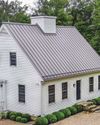
AN OVERVIEW OF METAL ROOFING
METAL ROOFS ARE RESURGENT, FOR GOOD REASONS.
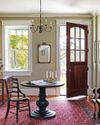
ENDURING BEAUTY IN WALLS of STONE
Now back in the family who had been here since 1830, the old farmhouse is again ready for generations to come. Additions dating to 1840 and the 1950s were preserved.

ARCHITECTURAL DETAILS COME TO LIFE
Owners and their designer celebrate the unique features of a 1912 Arts & Crafts Tudor.
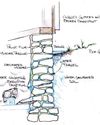
For a Wet Basement Wall
If there's problem common to old houses, it's a wet basement. I'm not talking about occasional flooding, but rather a basement that apparently seeps or leaks after even a rain shower or during snowmelt. Several approaches are available; sustainable solutions will get to the root of the problem.
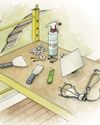
Patching a Plaster Wall
Fix a hole in the wall with a few common tools and some drywall supplies. Practice your technique!
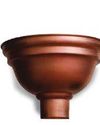
Roofing & Siding
Make note of these historical and unusual materials for the building envelope.
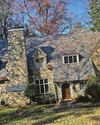
The Riddle of the water
When water incursion happens, the roof isn't necessarily the culprit. Maybe snaking a drain line, or clearing debris from a clogged gutter, temporarily will stem a leak. But a recurring problem usually means other forces are at work. It takes persistence-and a team with the right skills and patience—to identify the source and apply a solution.

Light-filled Craftsman Redo
For a dark kitchen in a 1914 Illinois house, the trick was anchoring white expanses with woodsy warmth.